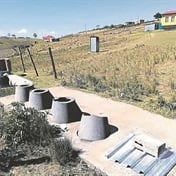
Just a month ago the country breathed a collective sigh of relief when what had been termed “the world’s worst outbreak” of listeriosis was officially declared over.
The food-borne outbreak that caused a “polony panic” had, in just less than a year, killed more than 200 people – mostly babies younger than 28 days old – and was confirmed in more than 1 000 people.
But last week, reports from a new local study that polony contaminated with Listeria monocytogenes bacteria was still being found in rural and informal settlements sparked widespread concern that the country wasn’t completely free from the deadly threat.
And the company – the Limpopo food manufacturing plant where the source of the outbreak was found – has reacted to the study by the University of Pretoria (UP), one of the several universities which form part of the Centre for Excellence in Food Security, saying that the reports were “concerning” and that it was investigating the matter.
“In terms of the recall [in March], Tiger Brands received a notification order from the National Consumer Commission to conduct a national recall of three products – Enterprise Frankfurters, Enterprise Smoked Russians and Enterprise Polony.
"The company elected to conduct a full national recall of all Enterprise Foods’ products, as well as to suspend all value-added meat products operations, to thoroughly investigate the matter,” Nevashnee Naicker, the group communications and stakeholder manager told City Press.
According to the company, it destroyed about 4 500 tons following the recall.
“Given this extensive campaign, it is concerning to note the study by UP has indicated that contaminated products may still be in the market in some rural areas.
"Tiger Brands has not produced ready-to-eat chilled processed meats since we halted production in March. Any products produced by the company prior to cessation of operations would be well out of shelf-life,” said Naicker.
The study showed the bacteria was found in other food products that were not identified during the initial outbreak and were ready-to-eat meat products not manufactured by Enterprise Foods or Tiger Brands.
The study covered a sampling period of before, during and after the Listeriosis outbreak and researchers collected 344 samples of polony between December 2016 and September this year, covering 77 brands sold by 20 food outlets in both the formal and informal sectors in eight of the country’s nine provinces.
In 2016 before the outbreak was official, out of 42 samples collected, two tested positive for the listeriosis causative bacteria.
After the official announcement, in December last year, 186 samples were collected, of which eight were positive.
The significant finding from the research was that, even once the source was identified and the product recalled, four samples from 116 samples collected, still tested positive for the bacteria.
Dr Juno Thomas, head of the centre for enteric diseases at the National Institute for Communicable Diseases, said what would be interesting and useful to know is when the products were produced – before or after the recall.
“If they were produced after the recall was announced, then it’s more concerning for us,” she said.
“I don’t doubt the researchers’ findings are true. From my understanding the research is based on polony samples taken before, during and after the outbreak from a number of places and a number of brands.
"To my knowledge, whole genome sequencing wasn’t done on the samples so we can’t prove that these brands are linked to any cases, or that they had the ST6 strain that was the outbreak strain.”
Thomas said that scientists hadn’t detected the ST6 strain in the isolates coming into their labs since the source of the outbreak was found and the products were recalled.
But she still cautioned “high-risk groups”, such as pregnant women and people living with HIV, to still err on the side caution when eating ready-to-eat processed meat and unpasteurised dairy products, and either not eat it at all or cook it thoroughly before consuming.
“The number of cases has dropped down to the incidental levels we saw before the outbreak. The thing we should remember is that we expect to see Listeria monocytogenes cases throughout the year just because it’s widely prevalent in the environment and given our population size.
"But we have no reason to believe there is an outbreak [of listeriosis] in any of the outbreak-related foods,” she said.
TALK TO US
Do you think it was too early to declare listeriosis a thing of the past? Do you still eat polony and other processed-meat products?
SMS us on 35697 using the keyword POLONY and tell us what you think. Please include your name and province. SMSes cost R1.50. By participating, you agree to receive occasional marketing material




 Publications
Publications
 Partners
Partners








